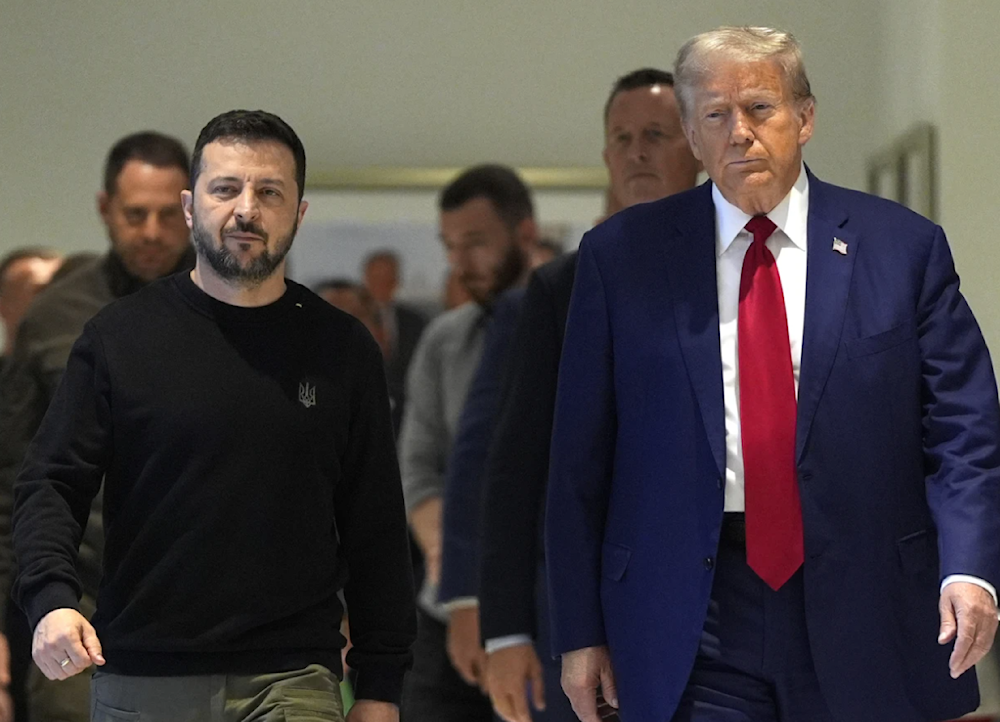Trump informs Europe he wants 5% NATO defense spending target
Donald Trump has previously revealed he would consider leaving NATO if allies didn't "pay their bills."
-

Preisdent-elect Donald Trump meets with Ukraine's President Volodymyr Zelensky at Trump Tower, in New York, on September 27, 2024. (AP)
Donald Trump's staff has informed European diplomats that the new US president will require NATO member nations to boost defense expenditure to 5% of GDP but plans to continue supplying military aid to Ukraine.
According to those familiar with the discussions, the US president-elect's closest foreign policy advisors revealed his objectives with senior European officials this month as he finalized his views toward Europe and the war in Ukraine.
Last week, in his first major televised interview, Trump said he would "absolutely" consider leaving NATO if allies didn't "pay their bills."
"They have to pay their bills," Trump told NBC's "Meet the Press," saying he would "absolutely" consider taking the United States out of the alliance unless members are "treating us fairly."
He also suggested that US backing for Ukraine would be reduced, stating he would "probably" limit funds to Kiev, which the United States has been steadfastly backing since the war in Ukraine broke out.
During his presidential campaign, Trump promised to cut off funding to Ukraine, compel Kiev to hold rapid peace negotiations, and leave NATO countries undefended if they did not pay enough on defense, which alarmed European capitals.
However, in a boost to friends severely concerned about their capacity to sustain and safeguard Ukraine without Washington's backing, Trump now pledges to keep US military supplies in Kiev after his inauguration, according to three additional sources informed on the conversations with Western officials.
At the same time, Trump plans to demand that NATO increase its 2% expenditure objective, which only 23 of the alliance's 32 members now fulfill, to 5%, according to two individuals familiar with the discussions.
According to one source, Trump would settle for 3.5% and intended to openly link more defense expenditure to the prospect of more favorable trading conditions with the United States. “It’s clear that we are talking about 3% or more for [NATO’s June summit in] The Hague summit,” said another European source familiar with Trump's plans.
NATO allies are discussing increasing defense spending to 3% of GDP at the upcoming June summit, though many are concerned about the economic challenges. The US plans to spend 3.1% of its GDP on defense in 2024, while key European NATO members, including France, Germany, and the UK, met with NATO Secretary-General Mark Rutte and Ukrainian President Zelensky to discuss how defense policy might shift in response to Trump's potential return to power.
German chancellor Olaf Scholz spoke with Trump via phone at an EU leaders' conference on Thursday. Scholz subsequently told reporters that he was "quite confident that the US and Europe will continue their support to Ukraine"." Senior British security officials visited Washington earlier this month to examine the president-elect's plans.
While Trump continues to feel Ukraine should never join NATO and wants the war to stop immediately, the president-elect thought that delivering arms to Kiev following a truce would secure a "peace through strength" conclusion, they added.
Following 24 hours of negotiations with NATO and EU officials in Brussels this week, Zelensky stated on Thursday that European commitments to support Ukraine would "not be sufficient" without US engagement.
More Americans in favor of quick end to Ukrainian conflict: Survey
Americans are split over whether their government should continue to aid Ukraine in taking back Russian-controlled territory, analytics firm Gallup said.
48% of Americans said they would continue to aid Ukraine, even in a prolonged conflict, while a greater portion of 50% said they would prefer a quick end to the conflict, even if it means that Ukraine does not recover all lost territory. Previous surveys indicated that most Americans supported pursuing a decisive Ukrainian victory. However, the latest review reveals a significant shift in public opinion.
Out of the six reviews conducted by Gallup on the matter, this survey is the first to find that more Americans prefer a quick end to the conflict, under the aforementioned circumstances.
Moreover, 37% of US citizens believe that the government is doing too much to support Ukraine, 31% believe what is being done is the right amount, and 30% believe it is not enough.
As for partisan preferences on the issue, stark differences have been noted between Republican and Democrat views on the issue. While Republicans largely prefer a quick end to the conflict (74%), Democrats widely back a prolonged commitment to Kiev's efforts (69%).
Gallup also found that "Americans have become increasingly supportive of seeing a quick end to the Russia-Ukraine war, and Ukrainians may agree."
Another poll conducted by the firm in Ukraine revealed that a slight majority of Ukrainians are now in favor of a negotiated end to the war as soon as possible.

 5 Min Read
5 Min Read








